27 things making your house smell bad
Freshen up your home and make it smell amazing

polinaloves / Shutterstock
Pesky odours hiding in the house can be hard to eliminate. From waste bins stinking out the kitchen to sofas that have picked up a stench, we've located the common denominators that might be making your home smell to high heaven and found ways to make sure your space is smelling sweet again.
Read on for scent-sational stench-stopping tips and tricks...
Clean upholstery to eliminate bad smells

New Africa / Shutterstock
The sofa is the second most used item of furniture in the house after our beds. As well as crumbs, pet hair, human skin particles and sweat can be left behind on a sofa and start to smell.
To make your sofa sweet smelling again, brush the surfaces of cushions, vacuum in between cracks and, if possible, remove and launder the seat cushions. Other options include deodorising with bicarbonate of soda, washing-up liquid and white vinegar or steam cleaning. If the weather permits, taking a sofa out into the garden for airing also helps eliminate smells.
Disinfect chopping boards
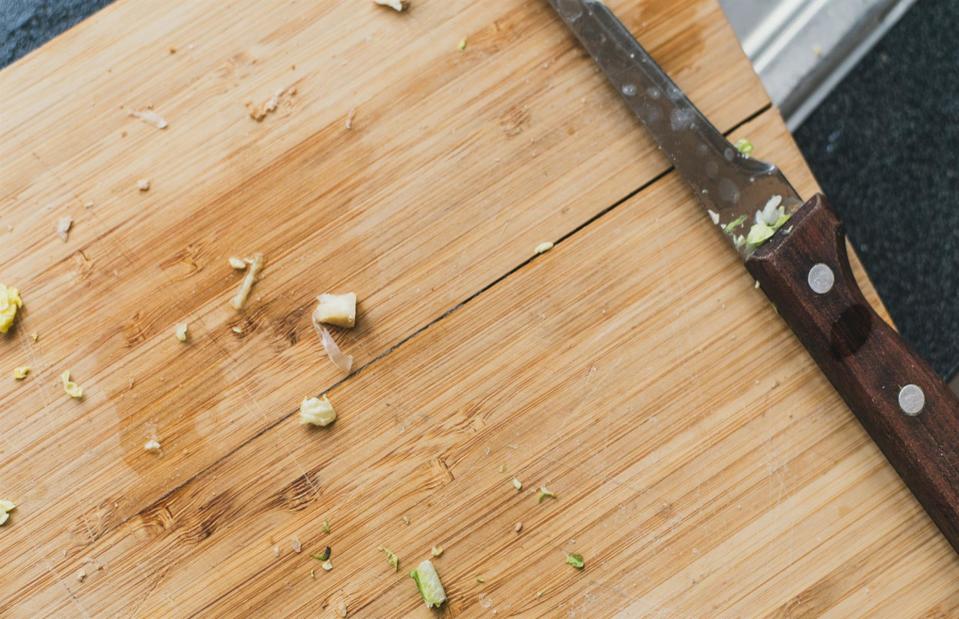
etonastenka / Shutterstock
We use chopping boards for pretty stinky food types – raw meat, garlic, herbs and fish to name just a few. So, is it any wonder that left unsanitised the handy kitchen tools soon start to reek?
Breeding bacteria is one of the reasons a stench might start to occur on food prep surfaces so it's vital chopping boards are deep cleaned regularly. As well as thoroughly disinfecting chopping boards, coarse salt and lemon will help to eradicate lingering odours.
Deal with mould

Marcus Krauss / Shutterstock
A musty smell in the bathroom can indicate mould and dampness so shouldn't be ignored. Worse still, if the smell is similar to that of cat urine, it can indicate dangerous toxic mould.
If you spot mould in your bathroom, try removing it with a 10% bleach and water solution while windows are open. While cleaning is a short-term fix you may need to repair water damage or improve the bathroom ventilation. Read our guide on how to get rid of mould as the odour could be a warning there is a hidden hazard lurking in your home.
Empty the kitchen bin regularly

G.MARTYSHEVA / Shutterstock
Emptying the bin is a household chore that can cause the most arguments. But, it's an essential chore that needs to be completed regularly or it will leave a stench that lingers. It's wise to also keep the bin itself clean if you're not regularly sanitising the whole bin the stench won't leave with the rubbish bag.
The Good Housekeeping Institute advises lining the bin with disposable newspaper to soak up dreaded bin juices. While Sophie Hinchliffe of @mrshinchhome uses a diluted Zoflora and water solution to spray, wipe down and disinfect her bin regularly during her famous #zoflorahour.
Keep shoes clean and dry

Pencil case / Shutterstock
Smelly shoes are an all too common issue and when there are many piled up in a hallway, so that a cheesy feet smell is concentrated – yuk.
Natural smelly shoe remedies include sprinkling them with bicarbonate of soda, spritzing with a water and white vinegar solution or simply leaving them outside in the sunshine to ventilate. A few drops of essential oils dripped into shoes will also help to mask the stinky odour.
Deep clean the dishwasher

Nadezhda Mikhalitskaia / Shutterstock
A dirty dishwasher will not only stop working as efficiently but create an adour that could then transfer onto tableware. If you are noticing a pong and there is debris left on your dishes after cleaning then your dishwasher may need a DIY MOT.
Try unblocking the spray arms – a toothpick is useful. Remove and wash the filters with warm soapy water and once back together, run a cycle with a dishwasher cleaner to remove dirt and grease from deep inside the machine.
Avoid a strange smell in the fridge

TY Lim / Shutterstock
If you walk into your kitchen and smell a funky fridge, it could be time for a clean-out. Odours are a sign that food has passed its sell-by date, or worse, is starting to rot. But, there may also be spillages or you could have a clogged drain hole.
If you can, do an audit every few months to discard anything that has expired and to give your refrigerator a good clean. Top tip: many people forget or don't even know about the drip pan that sits underneath the refrigerator to catch moisture. Add it to your deep cleaning routine to eliminate mould or musty odours.
Purge pet beds
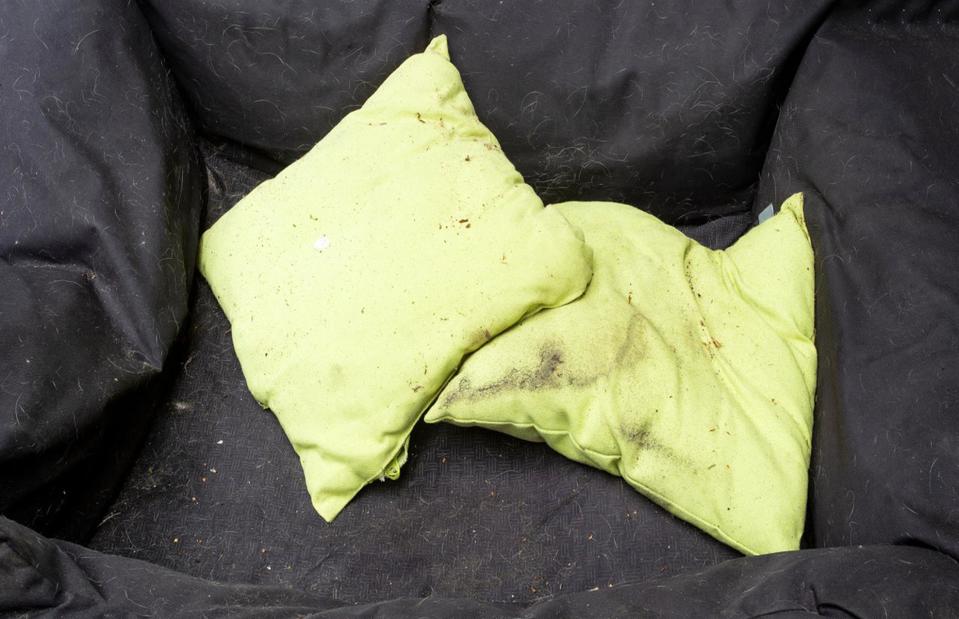
A-photographyy / Shutterstock
Dogs spend an average of 12 to 14 hours a day sleeping. After all those fun walks in the rain, mud or snow their pet beds can become a dirty, damp and pungent pooch pad.
The experts recommend that dog beds (or the outers at least) and blankets should be washed once a week for optimum hygiene. You could also add a waterproof liner to keep dander, dirt and even mites away from the bed mattress, making cleaning easier.
Launder bed linen

Yavdat / Shutterstock
Not changing your bed linen frequently enough will almost certainly create a lingering pong in the bedroom. According to Which? sheets should be changed once a week and washed at 60°C (140°F) as colder temperatures may not kill all the bacteria or remove sweat as effectively. If you have silk sheets, wash them at 30°C (86°F), but always check the label.
You can make bed linen smell lovely for longer by washing it in a strongly scented fabric conditioner. Alternatively, give sheets a deodorizing wash with bicarbonate of soda and replace the fabric conditioner with white vinegar.
Sanitise shower drains
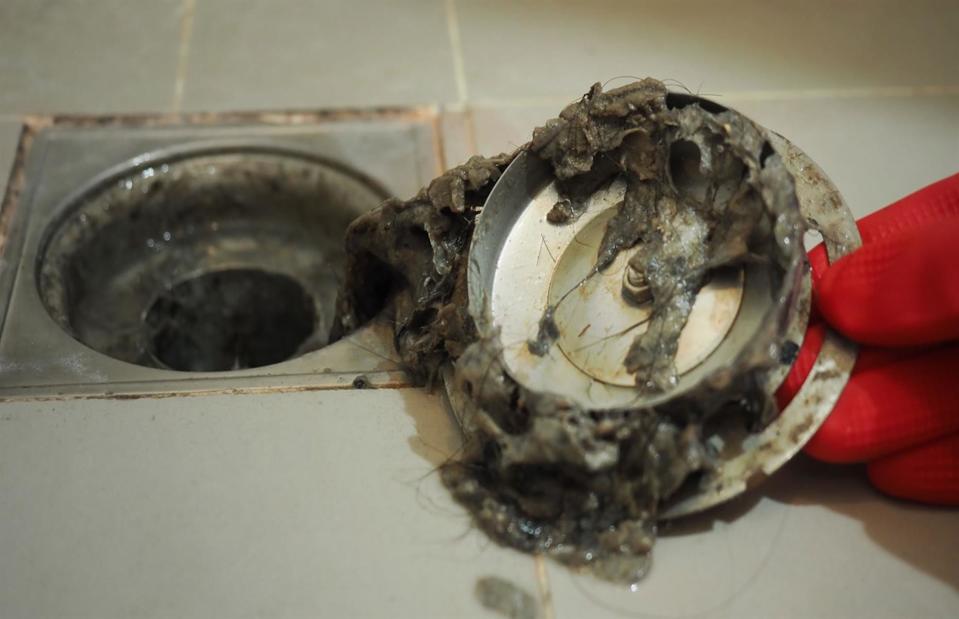
gnepphoto / Shutterstock
When it comes to cleaning the bathroom shower, drain covers are often forgotten. However, after regular family use it doesn't take long for shower drains to become clogged with hair and soap residue, which soon turns to stinky slime.
Inspect your shower cover regularly to remove and clean away any build-up. If yours hasn't been cleaned for a long time or you are moving into a new house, it might be wise to invest in a brand new shower drain cover, which is easily available online or from plumbing merchants.
Banish burnt food smells

SB2010 studio / Shutterstock
Accidents happen. If you have left something on the hob too long and it's boiled over or scolded the bottom of a pan, there is a good chance the house will reek of burnt food.
To rid the house of that smoky smell, throw out the burnt food straight away, open some windows and clean the pots as soon as possible. To remove burn marks, you can use white vinegar and bicarbonate of soda as well as chemical hob cleaners, but always follow your manufacturer's instructions to avoid damage.
Eradicate cooking smells
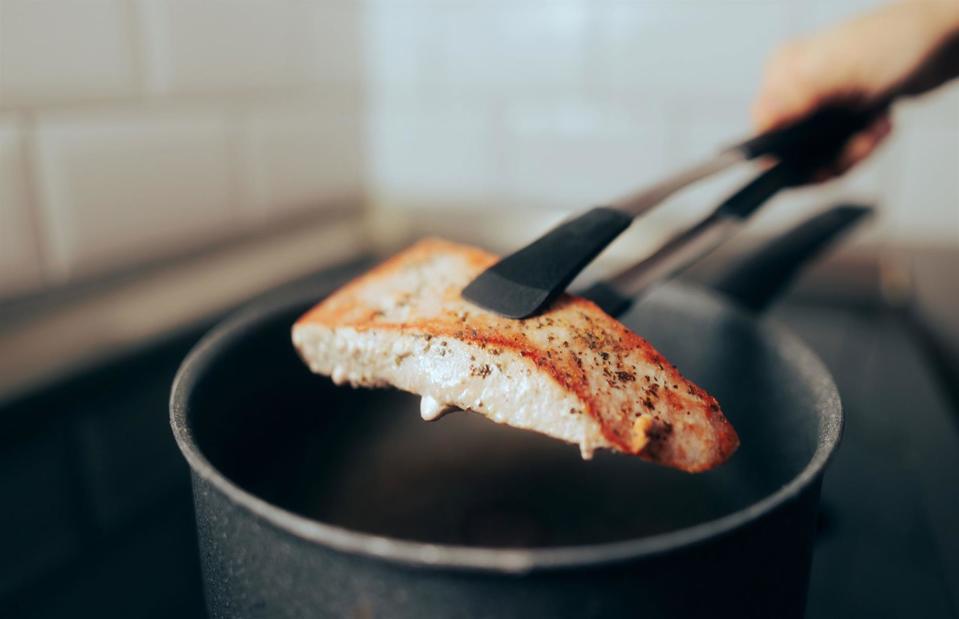
Nicoleta lonescu / Shutterstock
Fish is a delicious choice of dinner, but its odour can hang around long after it has been cooked and consumed. To flush out the fishy smell, choose fresh fish to start with and baking is better than frying. To eradicate the odour as soon as possible, clean up right away.
There are a few tricks to freshen the kitchen after cooking fish: boil some vinegar in water. Citrus peel or essential oils work well too. Ventilate the space and light a sweet-smelling candle or pop a diffuser and reeds on the windowsill. Choose an uplifting fragrance that will give your kitchen a bright and optimistic feel.
Remove mould
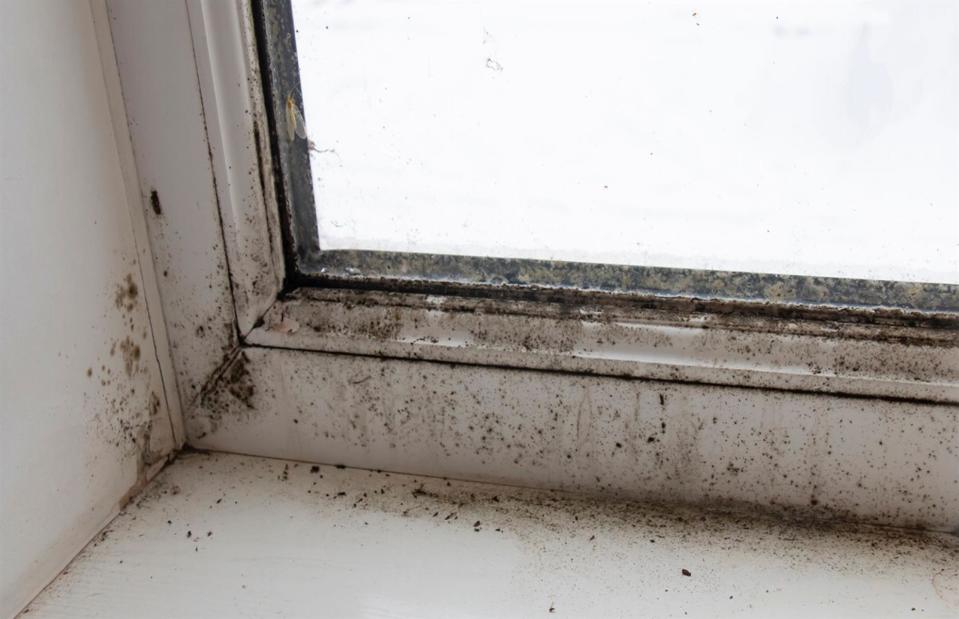
Ejuards Gedrovics / Shutterstock
As we move into colder months, dreaded mould often returns to homes bringing a nasty smell with it. As well as a pain in the nose, the stinky smell can be more of a problem. Left untreated mould can be a silent killer.
It's important to investigate the type of mould in the home before you eradicate it. Once removed, put measures into place to minimise its return by ventilating rooms, cleaning damp environments regularly and perhaps investing in a dehumidifier.
Wash out the washing machine
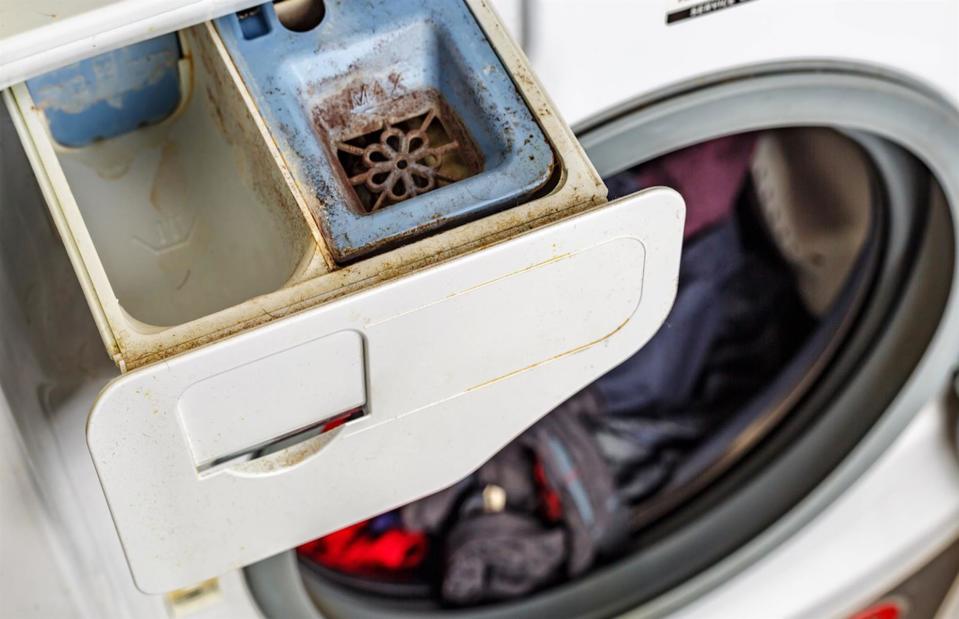
Bukhta Yurii / Shutterstock
Whether you own a front-loading or top-loading washing machine, unless it is maintained, dirt and residue can soon build up, which can turn icky and stinky. And, worse still the musty, stale fumes can transfer onto your otherwise clean laundry.
Cleaning your washing machine is an essential laundry hack that will leave laundry smelling fresh again. Make sure leftover detergent, softener and dirt are wiped from all parts of your washing machine including the drawers, seal and filter and use a washing machine cleaner regularly.
Mask bathroom bin odours

HestiRahayu / Shutterstock
As well as the kitchen bin, be sure to empty and clean the bathroom bin just as regularly. Discarded items such as tissues, cotton buds and sanitary items will not only start to smell if left undisposed but can soon become a health hazard. As with kitchen bins, ensure bathroom waste bins are emptied and cleaned often.
Here's a tip to clean your home like a professional: keep a few new bin liners at the bottom of the small pedal bin. This will ensure a fresh liner is always waiting when you need to take out the trash. A cotton ball soaked in a few drops of essential oil placed in the bottom of the bin will also mask any odours.
Invest in an air purifyer

Blueair / Press Loft
Air purifiers are a practical investment to tackle general odours in the home. A high-quality model will improve air in the home by sucking out impurities that can cause allergies as well as smell bad. Look for a model that suits the room size and a practical noise level.
Featured air purifier available from Blueair.
Change the sponge

New Africa / Shutterstock
We all know cleaning kitchen worktops regularly is an important part of keeping an organised kitchen. However, doing so with a dirty sponge or cloth can have adverse effects and leave lingering smelly bacteria on surfaces.
To ensure a sweet-smelling and clean sponge, ideally, it should be changed once per week. Also, if you are guilty of using the same sponge for all cleaning jobs – stop now! @officially_cleen swears by colour-coded multipurpose microfibre clothes that have cute labels for each separate cleaning job.
Keep on top of laundry

Travis182 / Shutterstock
Keeping on top of laundry will not only help declutter your home for good but eradicate any chance of damp clothes turning musty. Damp towels left on the floor, wet washing left sitting in the drum for hours and laundry packed onto an ineffective dryer will lace your home with the scent of mildew.
To dry up any excessive moisture, give your laundry an extra spin, remove clean clothes from the drum as soon as a cycle has finished and dry items in a well-ventilated space. A dehumidifier will also work wonders, too.
Wash dishes after every meal

New Africa / Shutterstock
As well as an eyesore, dirty dishes and utensils left on the kitchen side are hazards to family health. As well as becoming a breeding ground for bacteria that smell bad, the tableware with scraps left on can attract cockroaches, flies and even mice.
Doing the dishes immediately is better than playing catch up, plus it is more hygienic and your nose and immune system with be grateful for it.
Tackle a drain smell

Igal Vaisman / Shutterstock
Putting food down a kitchen sink will soon make it start to reek. Worse still, smelly scraps will soon build up and block the sink entirely. Most importantly, never pour cooking oils and fat down your sink as this can cause serious clog issues.
To keep your drains in top condition, you can clean them by using a plunge to dislodge stubborn clogs. You can also use an unblocking cleaning fluid to help dissolve any grease. White vinegar, bicarbonate of soda or scented disinfectant will also give kitchen sink drains a sweet-smelling refresh.
Vacuum to the max
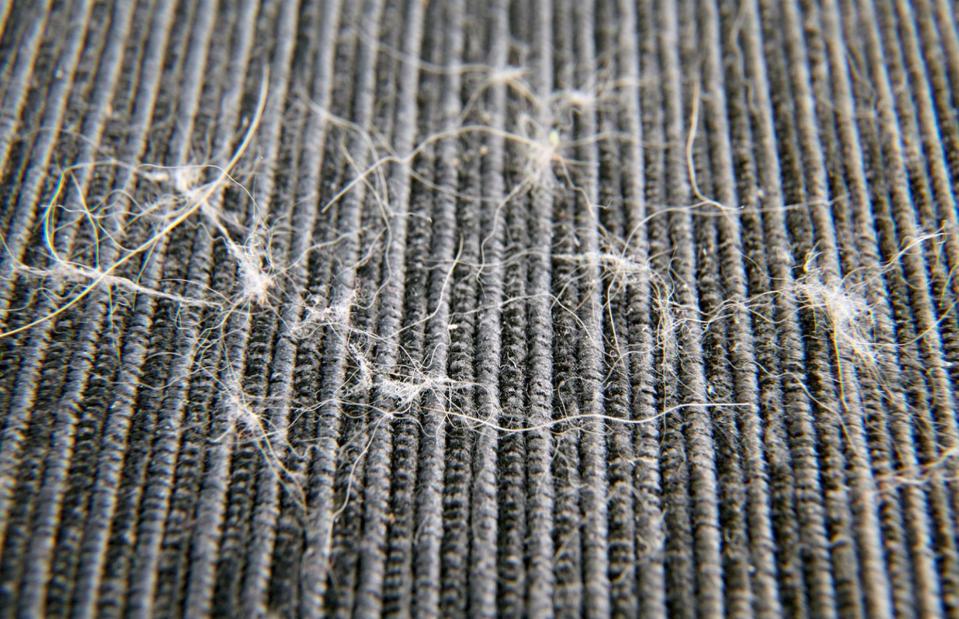
onebit / Shutterstock
There is a reason your elders taught you to remove your shoes when you enter your home. Brace yourself, a study by the Cleaning Industry Research Institute (CIRI) has revealed that shoes tested had an average of 421,000 units of bacteria on the outside of a shoe that can be walked onto carpets.
Dirt, dust, human and pet hair build-up in carpets and rugs is a breeding haven for odour-inducing bacteria if not vacuumed at least three times per week. For fresh-smelling carpets, invest in a machine-washable rug. Or give carpets a deep clean at least twice a year.
Remove pet food

inventbbart / Shutterstock
As much as we love our pets, their taste in food may not be so delicious for us and when it's left out it can start to pong.
To remedy this, it's best to avoid leaving pet food sitting out for hours by removing the food and cleaning pet bowls straight after feeding time. It will also encourage pets to eat while food is there rather than encouraging grazing. Plus, water left to sit and go smelly and stagnant can attract flies and bugs. Always make sure a pet water bowl is topped up with fresh, clean water.
Repot houseplants

Sophia Floerchinger / Shutterstock
Houseplants are a joy to own. When healthy they add colour, purify the air and create pretty focal points in a room. However, if not looked after correctly, the natural asset can soon 'soil' a decorating scheme with a stench.
Stale smells coming from houseplants could be a sign the plant is receiving too much water. Excess water then starts to breed bacteria that can then start to grow soil surface mould. The soil will then begin to smell stale and even give off a stench like a rotten egg. To remove the stench, repot the plant – if still alive in good-quality potting soil and water only when the new soil is dry to the touch.
Banish sewer smells
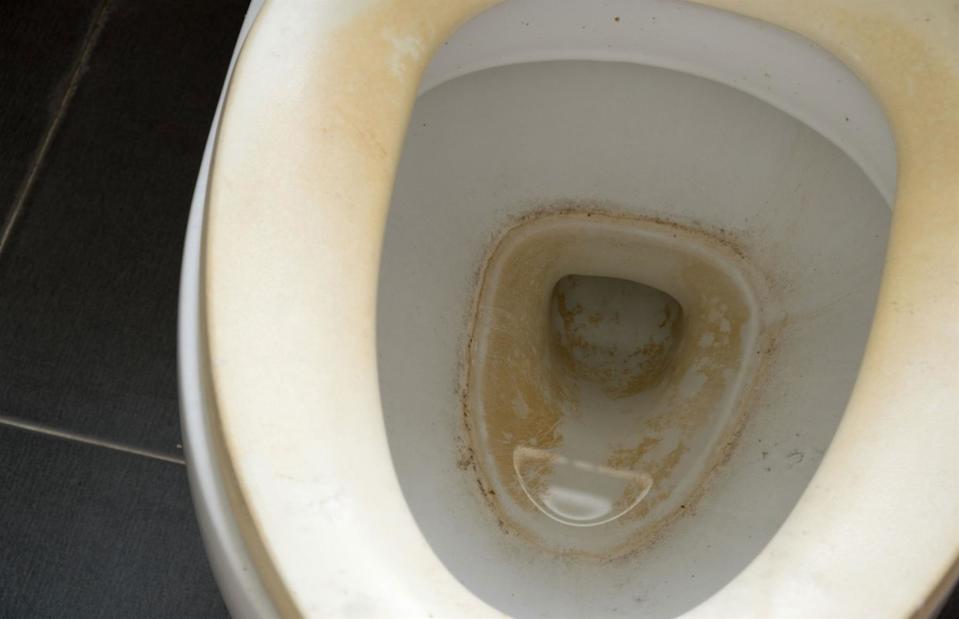
Shortboy / Shutterstock
The toilet is the most obvious part of the home that needs to be kept clean to ensure a home stays healthy and hygienic. But, it's not just human waste that can cause a stink. Bacteria, mould, a blocked drain pipe or broken toilet seals can all contribute to a stinky loo.
Make sure the toilet is part of a regular cleaning routine to ensure the toilet bowl is kept free of odour-inducing bacteria, hard water stains and discoloured toilet seats.
Keep household pests out

IrinaK / Shutterstock
Stinky animal droppings or worse, the smell of a dead animal in your home, is a rancid issue that can be hard to trace and remove. Common places to look for a corpse are behind a fridge, under kitchen kickboards, in kitchen cupboards or unfortunately under floorboards or in between walls.
Once located and disposed of, ensure the area is thoroughly cleaned. The best way to rid a future stink is to stop letting the culprits in. Block up holes, put food away and read our guide on how to get rid of common household pests.
Keep your house smelling good

ffolas / Shutterstock
Sometimes, you need a quick fix to have your home smelling sweet. If you’re keen to avoid chemical-laden air fresheners and plug-ins, why not try this clever tip from the blog, Of Life and Lisa: "Before inviting guests over, I boil a small pot of water and I add a few drops of vanilla extract to it. Sometimes I add orange peels. I leave this on the hob for a few minutes to get my entire home smelling good." Try it and everyone will be amazed by your fragrant abode.
Freshen floors with essential oils

Yuri Arcurs / Alamy Stock Photo
Looking for an eco-friendly floor cleaner that smells lovely? Eucalyptus is ideal because of its natural disinfectant properties. Try adding 15 drops of eucalyptus essential oil to a bucket of hot water to keep floors clean and germ-free.
Another top tip to make your own air freshener is to add 20 drops of your chosen essential oils to one tablespoon of bicarbonate of soda in a small bowl and mix thoroughly. Add the mixture to a 100ml spray bottle and top up with tepid water. Shake the bottle thoroughly before each use and simply spritz it into the air.


